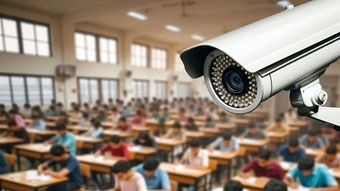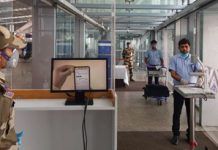Amidst ongoing controversies over alleged irregularities in NEET and NET exams, the Union Public Service Commission (UPSC) has decided to adopt advanced technology to ensure the integrity of its examinations. The premier recruitment body will utilise facial recognition and an Artificial Intelligence (AI)-based CCTV surveillance system to prevent cheating and impersonation in its various tests.
The UPSC has recently issued a tender inviting bids from experienced public sector undertakings to develop two technological solutions: “Aadhaar-based fingerprint authentication (or digital fingerprint capturing) and facial recognition of candidates and QR code scanning of e-admit cards” and “Live AI-based CCTV surveillance service.”
The tender document, dated June 3, 2024, states, “The UPSC attaches great importance to the conduct of its examinations in a free, fair and impartial manner.” “In its endeavour to fulfil these objectives, the Commission intends to make use of the latest digital technology to match and cross-check the biometric details of the candidates and to monitor various activities of the candidates during the examination to prevent cheating, fraud, unfair means and impersonation,” the document adds.
To enhance the examination process, the UPSC plans to incorporate Aadhaar-based fingerprint authentication, facial recognition of candidates, QR code scanning of e-admit cards, and monitoring through live AI-based CCTV video surveillance.
The chosen service provider will use data provided by the UPSC to authenticate candidates and perform facial recognition during the exam. The tender document specifies that facial recognition will involve a stateless transaction of two images — one provided during online registration and the other captured on the day of the exam.
Additionally, a real-time attendance monitoring system with GPS coordinates and timestamps will ensure enrolment is completed during the designated shift. The UPSC will implement CCTV/video surveillance with recording and live broadcast systems to monitor candidates and exam personnel at various centres nationwide.
“The service provider has to install an adequate number of CCTV colour cameras in every classroom (minimum 1 CCTV camera for 24 candidates), entry/exit gate, and control room,” the document specifies. The system will generate alerts for any detected movement at entry/exit gates, improper arrangement of furniture, offline cameras, or inactivity of invigilators, ensuring zero blind spots and real-time monitoring.
This development comes as the Central government faces scrutiny over alleged irregularities in the UGC-NET and NEET-UG exams. The UPSC’s initiative aims to bolster the integrity of its examination process, preventing malpractices and ensuring a secure environment for candidates.








